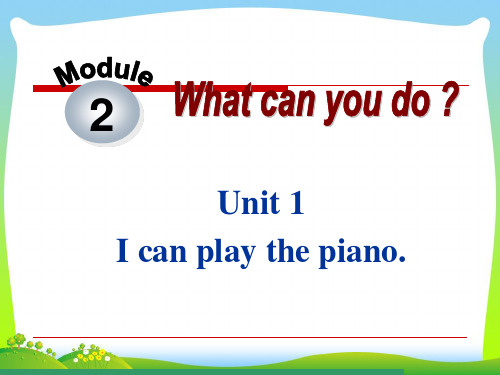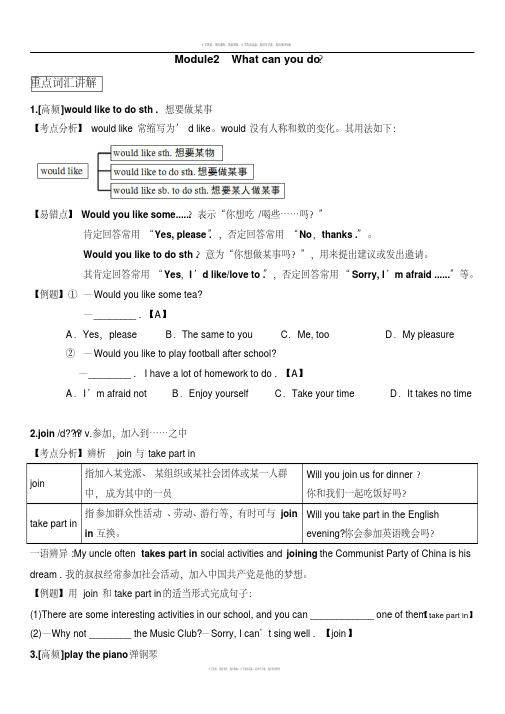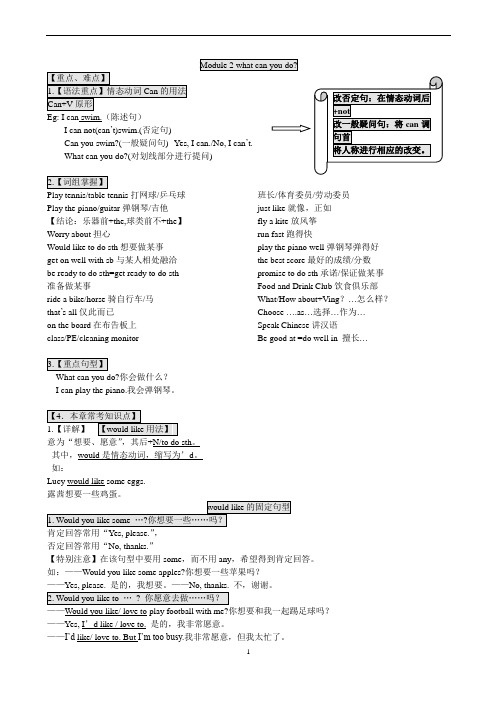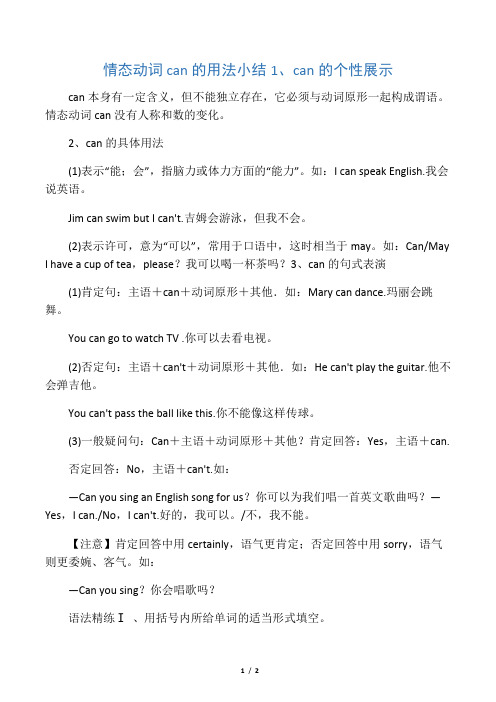七年级英语下册module2专项语法情态动词can外研版
2023年外研版七年级英语下册Module 2 Unit 2 I can run really fa

Module 2 Unit 2 I can run really fast导学案【学习目标】1.学生能根据音标正确拼读本单元的单词;(见课本P104-105)2.学生了解课本P10-11出现的短语和重点句型、熟练使用情态动词can;3.技能目标:学生能够听懂关于竞选班委的对话;能够表达自己的长处在哪;4.情感态度与价值观:引导学生肯定自我的能力,培养学生增强自信心以及以主人翁的意识积极为班级服务的精神。
【学法指导】探究中学习,合作中提升。
【重点与难点】情态动词can的用法;撰写一份竞选班委的讲稿。
Self-study(自主学习):1、自学自读本单元单词(结合词汇表的音标),把不会读的单词在书上画出来并整理在导学案上。
2. 阅读课文P10 Activity 2 找到以下短语并结合单词表或联系上下文写出它们对应的英文或中文:①新学期的开始②想要成为③与……相处融洽④work very hard⑤do well at school ⑥be always ready to help others⑦promise to do sth. ⑧be really good at⑨在家做家务⑩一个干净整洁的屋子⑪就像家一样⑫使我们的教室漂亮Cooperative study(合作学习)1、预习1情况交流,师生共同解决预习中存在的问题。
2、读Activity 2,师生或生生相互探讨解决其中的语言知识点(并划出你认为重要的、较难或精彩的词组或句子),完成预习2&3的检查。
3、学生小组合作完成预习4的检查,。
知识点链接:1.get on well with . 表示“与……相处的很好”“get on badly with .”是这个词组的反义词表示“与……相处的不好”。
对于“与……相处的怎么样”的询问,用特殊疑问词how. eg:--How do you get on with your classmates?2.I work very hard, and I do well at school.我在学校学习努力,表现很好。
情态动词can(解析版)-【寒假自学课】七年级英语寒假精品课(外研版)

第08讲情态动词can情态动词can是情态动词,意为"能;会",表示某人或某物具备的能力,还可用来提出请求,没有人称和数的变化,后面直接接动词原形。
下面来看一下它的具体用法。
1.表示有能力做某事,意为"能;会"。
►I can speak English.我会讲英语。
►He can play basketball.他会打篮球。
2.表示许可,意为"可以"。
►You can sit here.你可以坐在这儿。
3.情态动词can表示推测,意为"可能",常用语否定句、疑问句中。
►It can’t be a cat.It has a short tail.它不可能是猫,它有一个短尾巴。
下面一起来看一下can的句型变换:(1)变为否定句变为否定句时在情态动词can后加not,缩写为can’t。
►She can’t play the piano.她不会弹钢琴。
(2)变为一般疑问句变为一般疑问句时直接将情态动词can提到句首。
肯定回答为:Yes,主语+can.否定回答为:No,主语+can’t.►—Can you speak Japanese?你会讲日语吗?—Yes,I can./No,I can’t.是的,我会。
/不,我不会。
用Certainly.作肯定回答,语气更肯定;用Sorry.作否定回答,语气则更委婉、客气。
►—Can you sing?你会唱歌吗?—Certainly,I can.我当然会。
—Sorry,I can’t.很抱歉,我不会。
(3)变为特殊疑问句变为特殊疑问句时,其句型通常为"疑问词+can+主语+动词原形+…?"►What can yo u do?你会做什么?含情态动词can的句子的句式变换否定句/一般疑问句及回答方式否定句主语+can+not+动词原形+其他.一般疑问句Can+主语+动词原形+其他?肯定回答Yes,主语+can.否定回答No,主语+can’t.含情态动词can的特殊疑问句结构:特殊疑问词+can+主语+动词原形+其他?►What can you read?你能读什么?►She can do it well.她能做好它。
外研版七年级英语下册Module 2复习情态动词can课件(13张ppt)

三. Can you fill in the blanks? 1. _C_a_n_ you swim? Yes, I can. 2. --Can your father play the guitar?
--No, he _c_a_n_’_t_. 3. What club __d_o_ you want to join? 4. --Can Lucy and Alice dance?
B: We_w_a_n_t_ to join the chess_c_l_u_b_. A: Can you_p_l_a_y_ chess ? B: No , I _c_a_n_’t__. 5. She can speak English but she c_a_n_’_t__ speak it very well.
Can you dance ? 特殊疑问句:特殊疑问词+ 一般疑问句?
What can you do ?
陈述句:can + 动词原形
Can 无人称 数量变化 一般疑问句:Can+主语+动原…?
Yes,…can. No,…can’t. 否定句:主语+can’t+动原.
Kangaroos Birds Geese Fish Rabbits Cats Dogs
A. and B. but C. or D. so
( B )7.Tom can play the guitar but he _____
play it very well. A. can B. can’t C. not D. don’t
( C )8. ___do you want to join our club?
外研版七年级下册英语Module2Whatcanyoudo知识点及练习(有答案)

Module2 What can you do?重点词汇讲解1.[高频]would like to do sth .想要做某事【考点分析】would like常缩写为’d like。
would没有人称和数的变化。
其用法如下:【易错点】Would you like some......?表示“你想吃/喝些……吗?”肯定回答常用“Yes, please .”,否定回答常用“No,thanks .”。
Would you like to do sth .?意为“你想做某事吗?”,用来提出建议或发出邀请。
其肯定回答常用“Yes,I’d like/love to .”,否定回答常用“Sorry, I’m afraid ......”等。
【例题】①—Would you like some tea?—________ . 【A】A.Yes,please B.The same to you C.Me, too D.My pleasure②—Would you like to play football after school?—________ . I have a lot of homework to do . 【A】A.I’m afraid not B.Enjoy yourself C.Take your time D.It takes no time2.join /d???n/ v.参加,加入到……之中【考点分析】辨析join与take part injoin 指加入某党派、某组织或某社会团体或某一人群中,成为其中的一员Will you join us for dinner?你和我们一起吃饭好吗?take part in 指参加群众性活动、劳动、游行等,有时可与joinin互换。
Will you take part in the Englishevening?你会参加英语晚会吗?一语辨异:My uncle often takes part in social activities and joining the Communist Party of China is his dream . 我的叔叔经常参加社会活动,加入中国共产党是他的梦想。
外研版七年级下英语知识点总结

Unit1 Can you play the guitar?1.常见的情态动词:cancouldmaymightmust shall shouldwillwould等情态动词+动词原形,疑问句中情态动词提前,否定句在情态动词后加not。
2.Play+ the+乐器play the guitar. play the drums. play the piano. play the violin Play +球类.棋类.牌类游戏play volleyball. play chess.play cards.Play(games)with sb. 和某人一起玩(游戏)3.Join+组织或者人Join the art club join sb. Join in+竞赛.娱乐.游戏等Take part in+活动加入到某活动中Be in 参加.加入.穿着4. what club do you want to join?你想要参加什么俱乐部?The singing club唱歌俱乐部the drawing club 绘画俱乐部the dancing club舞蹈俱乐部the swimming club游泳俱乐部the story telling club 讲故事俱乐部The music /English /art/chess/sports club 音乐/英语/美术/象棋/运动俱乐部5. Pianist钢琴家violinist小提琴手singer歌手dancer舞蹈家musician音乐家6.Let sb do sth 让某人做某事Let’s+动词原形让我们做某事7.Say+内容say hello to sb. say sorry to sb. say to sb.Speak+语言speak English/Chinese/Japanese speak to sb.Talk 谈论talk about sth. talk with sb. talk to sb. talk show脱口秀Tell 告诉.讲述tell sb. sth= tell sth to sb.告诉某人某事tell sb. about sth 告诉某人关于某事tell sb. to do sth. 告诉某人去做某事tell sb. not to do sth 告诉某人不要去做某事tell stories/ jokes/lies讲故事/讲笑话/说谎Ask问.要求ask for 请求ask sb for sth 向某人索要某物ask about询问关于某事ask sb. about sth询问某人关于某事ask sb to do sth 要求某人去做某事ask sb not to do sth要求某人不要去做某事8.Want to do sth.= would like to do sth.=feel like doing sth.想要做某事Want sb. to do sth.= would like sb. to do sth.想要某人做某事Want to be+adj want to be + 职业9.What about =how about,后接名词,代词,动名词what about you你呢?what about the book这本书怎么样?what about dancing跳舞怎么样?10.也:too 肯定句末(前面加逗号)Either否定句末(前面加逗号)Also 实前助后As well 口语中(前面不加逗号)11.be good at+ sth/doing sth=do well in 擅长于…be good for 对…有益(be bad for对…有害)be good to 对…友好(good 可用friendly.nice.kind替换)be good with和…相处好=get on well with= get along well with12.感官动词(look. sound. taste. smell. feel)+ adj做表语13.选择疑问句用or来连接选择部分.回答不用Yes或No.要从中选择一个回答14.students wanted for school show(wanted表示招募.含有被动意义)15.show sth to sb=show sb sth让某人看某物the school show 学校演出give sth to sb=give sb sth给某人某物16.help sb do sth Help sb with sth helpful有帮助的With one’s help= with the help of sb在某人的帮助下Help oneself to 随便享用can't help doing sth.情不自禁做某事17.be busy doing sth忙于做某事be busy with sth忙于某事18.need to do sth need sb to do sth need….for…19.be free to do sth= have time to do sth有时间去做某事Have no time= don’t have time=be busy 没有时间20.make friends with sb 和某人交朋友make money 赚钱make a living 谋生make faces做鬼脸make fun of sb取笑某人21.call sb. at +电话号码call sb. back 给某人回电话22.on the weekend= on weekends23. English-speaking students说英语的学生(English-speaking有连词符,是形容词)24.do kung fu练功夫The old people’s home老人之家the Students’Sports Center25.It is +adj +for sb to do sth做某事对于某人是...形容词修饰名词.副词修饰动词或者形容词26.teach sb sth教某人…. Teach me Chinese teach him MathTeach sb to do sth 教某人去做某事Learn to do sth 学习做某事learn from sb./sth向某人学习、从某事中学习27. Write down写下write to sb =write a letter to sb.给某人写信write back to sb 给某人回信hear from sb 收到某人的来信At least至少make a poster制作海报28.定冠词the的用法(1)特指某(些)人或某(些)物,这是定冠词的基本用法。
七年级下册Module2what_can_you_do_知识总结与归纳练习

Eg: I can swim.(陈述句)I can not(can ’t)swim.(否定句)Can you swim?(一般疑问句)--Yes, I can./No, I can ’t.What can you do?(对划线部分进行提问) Play tennis/table tennis 打网球/乒乓球 Play the piano/guitar 弹钢琴/吉他 【结论:乐器前+the,球类前不+the 】 Worry about 担心 Would like to do sth 想要做某事 get on well with sb 与某人相处融洽 be ready to do sth=get ready to do sth 准备做某事 ride a bike/horse 骑自行车/马 that ’s all 仅此而已 on the board 在布告板上 class/PE/cleaning monitor 班长/体育委员/劳动委员 just like 就像,正如 fly a kite 放风筝 run fast 跑得快 play the piano well 弹钢琴弹得好 the best score 最好的成绩/分数 promise to do sth 承诺/保证做某事 Food and Drink Club 饮食俱乐部 What/How about+Ving ?…怎么样? Choose ….as …选择…作为… Speak Chinese 讲汉语 Be good at =do well in 擅长…---What can you do?你会做什么? ---I can play the piano.我会弹钢琴。
意为“想要、愿意”,其后+N/to do sth 。
其中,would 是情态动词,缩写为’d 。
如:Lucy would like some eggs. 露茜想要一些鸡蛋。
肯定回答常用“Yes, please.”, 否定回答常用“No, thanks.”【特别注意】在该句型中要用some ,而不用any ,希望得到肯定回答。
Grammar七年级英语下册——情态动词can的用法

情态动词can的用法小结1、can的个性展示can本身有一定含义,但不能独立存在,它必须与动词原形一起构成谓语。
情态动词can没有人称和数的变化。
2、can的具体用法(1)表示“能;会”,指脑力或体力方面的“能力”。
如:I can speak English.我会说英语。
Jim can swim but I can't.吉姆会游泳,但我不会。
(2)表示许可,意为“可以”,常用于口语中,这时相当于may。
如:Can/MayI have a cup of tea,please?我可以喝一杯茶吗?3、can的句式表演(1)肯定句:主语+can+动词原形+其他.如:Mary can dance.玛丽会跳舞。
You can go to watch TV .你可以去看电视。
(2)否定句:主语+can't+动词原形+其他.如:He can't play the guitar.他不会弹吉他。
You can't pass the ball like this.你不能像这样传球。
(3)一般疑问句:Can+主语+动词原形+其他?肯定回答:Yes,主语+can.否定回答:No,主语+can't.如:—Can you sing an English song for us?你可以为我们唱一首英文歌曲吗?—Yes,I can./No,I can't.好的,我可以。
/不,我不能。
【注意】肯定回答中用certainly,语气更肯定;否定回答中用sorry,语气则更委婉、客气。
如:—Can you sing?你会唱歌吗?语法精练Ⅰ、用括号内所给单词的适当形式填空。
1、I can't write(write) stories.Can you help me,Jack?2、—Can youshow(show) me your new bag,Jerry?—Yes.Here you are.3、What can your sister do(do)?4、Can you swim(swim) in the swimming pool with us on weekends?5、Can Peter play(play) football?Ⅱ、根据汉语意思完成句子,每空一词。
外研版七年级英语下册Module2Whatcanyoudo语法篇试题

Module 2 语法篇______________________________________________________________________________ ______________________________________________________________________________掌握情态动词can的用法情态动词的特征:(1)有一定的词义但不能单独作谓语,必须和行为动词或系动词连用,构成谓语。
(2)无人称和数的变化(have to例外,其第三人称单数形式为has to)。
如:We must stay here.(3)后接动词原形,即不带to的不定式。
如|:He may lose her way.(4)具有助动词的作用,可用来构成否定句、疑问句及用于简明答语。
如:--Can you sing an English song?--Yes,I can.情态动词can 的用法:情态动词can 后面跟动词原形。
它可以表示能力,译为“能,会”;可以表示怀疑、推测,译为“可能”;表示请求、允许,译为“可以”。
本单元主语集中讲述can 的肯定、否定和疑问形式。
1.表示能力,译为“能,会”。
如:Can you play basketball?2.表示怀疑、推测,译为“可能”,常用于否定句和疑问句中。
如:Lucy can’t be in the room.3.表示请求、允许,译为“可以”,相当于may。
如:You can go now.含有情态动词can 的肯定句变否定句时,直接在它后面加not;肯定句变一般疑问句时,把can提前即可。
见下表:如:My sister can sing.My sister can’t sing.--Can your sister sing?--Yes ,she can.--No ,she can’t.单项选择:1.--What can you do?--I __________ play tennis.A.canB.mayC.mustD.have to答案:A解析:can 表示能力。
- 1、下载文档前请自行甄别文档内容的完整性,平台不提供额外的编辑、内容补充、找答案等附加服务。
- 2、"仅部分预览"的文档,不可在线预览部分如存在完整性等问题,可反馈申请退款(可完整预览的文档不适用该条件!)。
- 3、如文档侵犯您的权益,请联系客服反馈,我们会尽快为您处理(人工客服工作时间:9:00-18:30)。
情态动词can
一、简介
1、结构:can + 动词原形,没有人称和数的变化。
2、否定形式:cannot/can’ t, cannot比缩略形式can’ t要正式。
口语中一般用缩略形式。
例如:I can swim.
Daming can ride a bike. He can’t drive a car.
二、用法
1、表示能力(体力、知识、技能等),此时可用be able to代替。
例如:Mary can speak three languages. 玛丽会说三种语言。
= Mary is able to speak three languages.
注意:(1)can只有一般现在时和一般过去式;而be able to则有更多的时态。
例如:I’ll not be able to come this afternoon. 今天下午我将会来。
(2)当表示“经过努力才得以做成功某事”时应用be able to,不能用can。
例如:He was able to go to the party yesterday evening in spite of the heavy rain.
尽管很大雨,他昨天能来参加聚会。
2、表示请求和允许。
例如:---Can I go now?
--- Yes, you can. / No, you cannot/can’t.
此时可与may互换。
在疑问句中还可用could,might(不可用于肯定句、否定句或答语)代替,不是过去式,只是语气更委婉。
例如:--- Could I come to see you tomorrow?
--- Yes, you can. ( No, I’m afraid not. )
3、表示可能性猜测。
例如:The man over there can′t be my uncle. My uncle has gone to Beijing. 那个人不可能是我的叔叔。
我的叔叔去北京了。
三、练习题
( )1.---Can I go fishing with you,Dad?。
